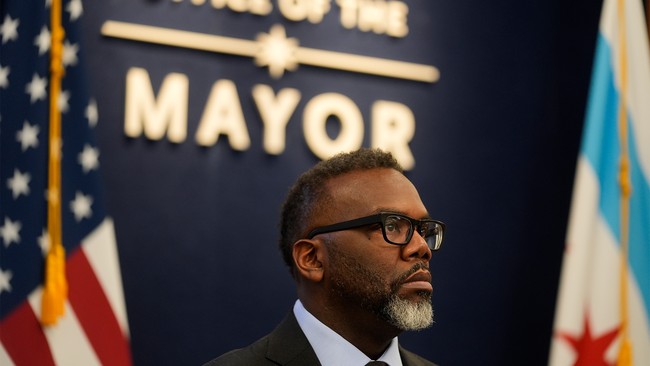Frederick, Maryland, Mayor Michael O’Connor has come under fire after announcing a new initiative that would allocate taxpayer funds to provide legal assistance to illegal aliens facing deportation.
The proposal, revealed earlier this week, comes amid increasing concerns about immigration policy as President-elect Donald Trump prepares to take office, promising to ramp up enforcement efforts.
The mayor’s plan outlines the creation of a legal defense fund intended to support immigrants who are at risk of deportation, specifically covering legal fees related to their cases.
Celebrate Trump’s Historic 2024 Victory with the Exclusive Trump 47th President Collection!
According to O’Connor, the fund is in line with Frederick’s commitment to diversity and inclusion.
However, the proposal has quickly sparked controversy, with many opponents questioning the use of taxpayer money for a cause they view as politically motivated.
Mayor O’Connor has defended the initiative, stating that it is essential for undocumented residents who contribute to the local economy and community.
He emphasized that many of these individuals do not have the financial means to secure proper legal representation, putting them at a distinct disadvantage during deportation proceedings.
BREAKING: Frederick, Maryland Mayor Michael O’Connor announced he’s creating a fund using tax dollars to help illegals pay for legal fees to fight deportations once Trump takes office pic.twitter.com/XN5hFZ0NMZ
— Libs of TikTok (@libsoftiktok) November 26, 2024
Advocates of the proposal argue that the fund is a necessary step to protect vulnerable families and ensure that basic human rights are upheld.
Local immigrant advocacy groups have voiced strong support for the fund, including Frederick for Justice, which praised the mayor’s decision.
The group stated, “This fund will provide critical support for our community members who are unfairly targeted due to their immigration status.”
Supporters also contend that the initiative could serve as a model for other cities across the nation.
They see it as a humane and just response to the challenges faced by immigrants in the U.S., particularly those who may be separated from their families or face harsh legal challenges.
Despite the support from some local groups, the initiative has faced intense backlash from critics who believe that taxpayer dollars should not be used in this manner.
Opponents argue that the fund prioritizes non-citizens over the needs of legal residents, many of whom are struggling with issues such as housing and education.
Karen Thomas, a local political activist and resident of Frederick, expressed her opposition, stating, “While I sympathize with those in difficult situations, taxpayer funds should benefit Frederick’s citizens first. This decision is shortsighted and divisive.”
Critics like Thomas argue that the focus should be on solving local problems before extending support to those who are not citizens of the country.
This backlash is reflective of broader national debates on immigration policy, with many conservatives criticizing what they perceive as local governments overstepping their bounds by funding initiatives that they believe undermine the rule of law.
With President-elect Trump promising stricter immigration enforcement, there is concern that Frederick’s initiative may invite legal challenges or serve as a political target for opponents of lax immigration policies.
As these discussions unfold, Mayor O’Connor remains firm in his commitment to the initiative, despite growing pressure from critics to reconsider the use of public funds.
The proposal is expected to be further debated in the upcoming city council meetings, where both supporters and opponents will have the opportunity to voice their concerns.
With mounting criticism and divided public opinion, the future of the legal defense fund remains uncertain.
O’Connor’s proposal will continue to be scrutinized, and its fate may ultimately depend on the discussions in the coming weeks.
Regardless of the outcome, the initiative has ignited a broader conversation about immigration policy, the role of local governments, and how taxpayer money should be allocated in times of political and legal uncertainty.
As the debate continues, O’Connor faces a tough battle to justify his decision and secure the necessary support for the fund.
The opinions expressed by contributors and/or content partners are their own and do not necessarily reflect the views of LifeZette. Contact us for guidelines on submitting your own commentary.
Read the full article here


![Maryland Mayor Announces Plan To Use Taxpayer Money To Defend Illegal Aliens [WATCH] Maryland Mayor Announces Plan To Use Taxpayer Money To Defend Illegal Aliens [WATCH]](https://www.lifezette.com/wp-content/uploads/2024/11/2024.11.27-02.24-lifezette-67472b9e02e6c.jpg)


![Newsom’s California Ad Busted for Using Footage from Ukraine, Quietly Deletes It [WATCH] Newsom’s California Ad Busted for Using Footage from Ukraine, Quietly Deletes It [WATCH]](https://www.lifezette.com/wp-content/uploads/2025/04/2025.04.17-08.43-lifezette-6800bf318f1e6.jpg)


![Sen. Kennedy Asks Kash Patel Point Blank if Epstein Killed Himself [WATCH] Sen. Kennedy Asks Kash Patel Point Blank if Epstein Killed Himself [WATCH]](https://www.lifezette.com/wp-content/uploads/2025/05/2025.05.09-06.44-lifezette-681e4d20c4474.jpg)

